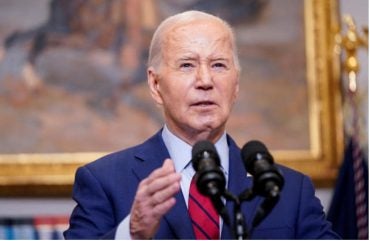
President Biden has into law HR 1042, the Prohibiting Russian Uranium Imports Act just two weeks after the bill was passed unanimously by the US Senate. The legislation, which bans the import of Russian-produced low enriched uranium (LEU), will come into effect 90 days after the date of the enactment of the bill, and will remain in effect until the end of 2040. Waivers may be granted to allow the import of limited amounts of LEU, under certain circumstances, until 1 January 2028.
Commenting on the development, the US Department of Energy (DOE) said it was “truly a transformative time for nuclear energy”. It noted: “We’re restarting old reactors, building new ones, and working to deploy advanced reactors to help us meet our clean energy goals. All of those will need fuel, and we can no longer rely on bad actors like Russia to supply it.”
DOE said the ban “is essential to strengthening our nation’s energy security and supports the development of uranium conversion and enrichment services right here in the United States that will result in thousands of new jobs for Americans across the country”.
DOE recognised that transitioning away from Russian-sourced fuel “will not happen overnight”. It estimates that US utilities have some three years of LEU available through existing inventory or pre-existing contracts. “To ensure our plants do not experience any disruptions, we’re creating a waiver process to allow some imports of LEU from Russia to continue for a limited time. In the meantime, we’re taking aggressive steps to establish a secure and reliable uranium supply market.”
The legislation unlocks $2.72bn that Congress recently appropriated to increase production of LEU and high-assay low-enriched uranium (HALEU) to support existing and new advanced nuclear reactors. “Under the HALEU Availability Program, we’re working on various activities to secure a domestic supply of HALEU,” DOE said. It noted that the demonstration project being developed by Centrus in Piketon, Ohio, had already produced its first small amounts of HALEU for next-generation reactors, “with plans to increase production to 900 kilograms in the near future”. DOE said it was also looking to award contracts this year for HALEU enrichment and deconversion services.
Collaboration with the “Sapporo 5”, a strategic partnership between the US, UK, Canada, France, and Japan, will “support the stable supply of fuels for existing, operating reactors and to enable the development and deployment of fuels for future advanced reactors”. To date this partnership has mobilised more than $4.2bn in government-led investments “to support the development of a secure, reliable global nuclear energy supply chain”.
Looking ahead, DOE “is working to support fuel development for our existing fleet of nuclear plants”. This includes “efforts to expand our domestic enrichment and conversion production capacity for LEU through contracts that we hope to award later this year”.
According to the US Energy Information Administration, Russia has been supplying about 24% of enriched uranium used to fuel the US fleet of 94 commercial reactors with 12% coming from Germany and 11% from the UK. and 27% produced in the US. DOE says Russia has roughly 44% of the world’s uranium enrichment capacity and supplies approximately 35% of US imports for nuclear fuel. The only commercial enrichment operation in the US is Urenco’s facility in New Mexico which began operations in 2010, Urenco is jointly owned by the UK, Germany and the Netherlands.
Russian officials noted that any negative effects from the ban are likely to be on the international market. Rosatom described the ban as “a discriminatory political move that would undermine the international market for enriched uranium but would not stop Russia from developing its global business”. Kremlin spokesman Dmitry Peskov told a news briefing “it’s hard for the Americans to compete with us on the international market”, adding that the ban was not critical for the Russian nuclear industry.
According to Russia’s Ambassador in Washington, Anatoly Antonov: “The current attack – not only on Russia, but also on the world market for uranium fuel used in nuclear power plants – will lead to new shocks in international economic relations. The delicate balance between exporters and importers of uranium products is under threat. Washington lacks sufficient national enrichment capacity and so is harming its own economy. Moreover, the financial losses for the United States will be much greater than for Russia.”






